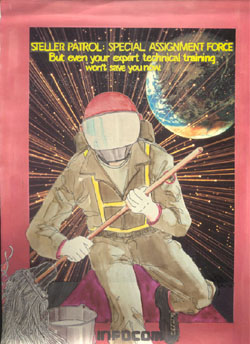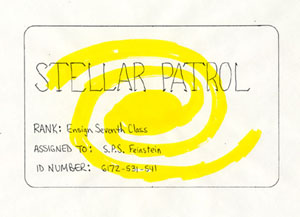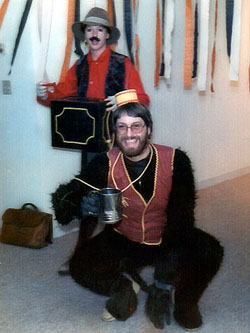From the dining room to the galaxy
A brilliant career could also begin with a sort of bug hunt. It's what
happened to Steve Meretzky: he started as a beta-tester and become one of
the best IF writer of all times.
Now he has another job because text adventure games are not a job anymore.
Maybe in another galaxy, in one of the worlds created from him, things would
have been different.
But now we can only remember what happened twenty years ago...
 It's
true that a roommate opened your road to Infocom? Can you tell us the story?
It's
true that a roommate opened your road to Infocom? Can you tell us the story?
In ’81, my roommate Mike Dornbrook was Infocom’s first and,
at the time, only tester. He started testing Zork I on an Apple II on our
dining room table. When he was around, I started playing a little, and was
soon very hooked. Zork II soon followed Zork I into our dining room “test
lab”. I reported all the bugs that I found, even though Mike was getting
paid to find bugs and I wasn’t. Then, Mike went off to business school
in Chicago, and Marc Blank needed someone to test Infocom’s next game,
which was Deadline. And since I’d done a good job finding bugs in
Zork I and Zork II, he asked me. I’d recently quit my job (working
for a construction company, which I hated) so I said sure!
Infocom didn’t have an office at the beginning… then
you choose one, isnt? Where it was? Can you describe it? What about the
atmosphere there?
At first (and this is before my time) Infocom just operated virtually.
Then, Infocom got a small office at Faneuil Hall in downtown Boston, just
a one-room office for the President (Joel Berez) with a shared secretary.
In January of 1982, Infocom moved into its first real offices, at 55 Wheeler
Street in Cambridge. It was a wonderful space, wood frame construction,
private offices (no cubicles), openable windows and personal heater/air
conditioners in every office, lofts, spiral stairs, a wooded courtyard with
a goldfish pond, a rec center with swimming pool on the premises... The
atmosphere at Infocom, especially in the early days, was great. Everyone
was young, it was a really creative group of people, the games were selling
extremely well, and it seemed like the sky was the limit. We worked together,
and socialized together as well. It was a fun working environment, and a
great group of people.
 Tell
us the best thing happened while you were at Infocom.
Tell
us the best thing happened while you were at Infocom.
The best thing was that I met Betty Rock who, for the last 15 years, has
been my lovely and loving spouse!
And the worst?
The worst was, of course, when Activision shut Infocom down in May of ’89.
And the three layoffs in ’85 and ’86 were also the pits.
Did you ever get angry with someone?
The angriest I usually got were the wrangles with marketing, and specifically
with the ad agency who did our packaging during the first several years.
They did some good work, such as the Deadline package, but they used to
gouge Infocom with all sorts of unconscionable charges, and they used to
make creative decisions that would impact the game without telling the game
writers. The worst: In my game Sorcerer, I wrote a guide to some of the
creatures you’d run across in the game. It was designed to be a little
booklet in the package. The agency came up with the idea of doing it as
a rotating data wheel, which everyone thought was a pretty neat idea. Many
weeks later, when it was far too late to change course, they came in with
the ready-for-press mockups of the code wheel, or as I named it, the Infotater.
They had cut all the descriptions of the monsters to less than half their
original length. “Oh,” they said, “of course we don’t
have as much space for text in this code wheel concept.” I blew my
top, and we went to a smaller point size, and restored some of the cut text,
and it was totally unpleasant. Ironically, a year later all the Infocom
games were repackaged into smaller, standardized packages (the familiar
ones, with pinstripes, that opened like a book) and the code wheel was too
large to fit into this new package – so the piece was redone…
as a booklet.
How much did you gain at the time?
I was always just a salaried employee at Infocom, so I never got royalties
or anything. But in addition to my salary, I also got tremendous job satisfaction,
and the start on a good career.
 By
what were - and are - you inspired? Which kind of books, movies, etc.?
By
what were - and are - you inspired? Which kind of books, movies, etc.?
No one thing, or handful of things… As a reader, growing up, I was
mainly an SF fan, and my favorite authors were Heinlein, Clarke, and Asimov,
later Niven and Card. I was a huge fan of the original Star Trek series.
I’ve always been a huge movie consumer, all genres. I’m probably
most known for my humor, and on that front my inspirations are also numerous:
Woody Allen, Monty Python, Gary Larson (The Far Side), B. Kliban, the early
Saturday Night Live, Dave Barry… In my younger days, Mad Magazine.
Which language did you use to write Infocom games?
Infocom had a proprietary language, called ZIL, that was based on a language
that the founders of Infocom had created at MIT’s Lab for Computer
Science, called MDL (pronounced “muddle”).
Which kind of language would you use today to write a game: Inform,
Tads, Hugo?
I don’t know enough to say; I’d have to look into it before
starting.
What is the best Infocom game in your opinion?
My favorite Infocom game has always been Dave Lebling’s “Starcross”,
but I also have always loved Jeff O’Neill’s “Nord and
Bert Couldn’t Make Head or Tail of It” for being so original
and different. And I must admit that I haven’t played all 40 or so
Infocom games through to the end, so it’s hard to answer the question
definitively.
And the worst?
I think the worst games were probably the InfoComix series that we did as
a joint venture with another company. They were sort of interactive comic
books, but the interactivity was on the level of a “what do I do now?”
book.
And the best adventure game ever written?
Well, I’d have to again say Starcross, although I’d have to
give honorable mention to the Zork Trilogy, just because of its historic
importance. I think Witness had the best writing I’ve ever seen in
a computer game. Visually, I’d give the nod to Grim Fandango. Also,
if you want to stretch the definition of an adventure game to include it,
I’ve always really loved The Fool’s Errand, by Cliff Johnson.
And the best author?
I’m not going there – too many of my friends are adventure game
authors, I’m not going to alienate most of them!
Which movie, which book could become a good adventure?
My criteria would be things where the book(s) or movie(s) creates a rich
universe with lots of possibilities for stories that aren’t necessarily
the one told in the original book or movie. For example, I think that’s
why Hitchhiker’s was such a successful game, and why it got better
further in the game, when we diverged more from the scenes of the original
story line. The Wizard of Oz series, the Highlander movies, Harry Potter,
the first Ender book by O. S. Card, are some examples off the top of my
head. The original Twilight Zone TV series would also be great material
for an adventure game.
Which suggestion would you give to IF authors?
Don’t quit your day job.
What about non professional adventure game of today?
I’ve played a few, and wish I had time to play more. The ones I’ve
seen are of pretty high quality, and I’m delighted to see that the
art form continues to thrive, albeit in a non-commercial form.
IF can have a new market?
Some new technology needs to come along that makes adventure games the coolest
and most cutting edge games again, instead of the least. Perhaps speech
recognition. Also, tools that bring down the cost of production without
reducing the quality of the presentation would help a lot, to make the genre
economically viable again.
What about Worldwinner? Are you happy working there?
I’ve been here just over a year now, and it’s been a lot of
fun. For your readers who aren’t familiar with worldwinner.com,
it’s an online game site where people can pay money to play games
of skill in tournament of various sizes; players with the highest scores
in each tournament win cash prizes. Anyone can play for free, but currently
the prize tournaments are only open to U.S. players; however, that will
be changing in the very near future, as we research each country's tax laws,
credit card laws, and laws regulating tournaments with prizes. It’s
been a nice change of pace from the previous 18 or so years. It’s
fun to work on these small, casual games; it’s exciting to be part
of a start-up again; it’s my first significant online experience,
so that’s pretty exciting for me; it’s wonderful to be able
to complete games in a month or two, compared to a couple of years! Also,
because of the download issues, we have to keep our games down to a few
hundred K, which is quite nostalgic after years of CD-based games measured
in the hundreds of megabytes.
 What
about you? What do you do in free time?
What
about you? What do you do in free time?
I live in the Boston area, married with two kids: Dan (13) and Sasha (about
to turn 11). I’m 44 years old, which on a game industry scale puts
me somewhere between “Moses” and “Methusaleh”. I
no longer have any free time, although DVDs have taken some of the sting
out of never being able to get a babysitter…
What about Douglas Adams? Working with him was a good experience?
Working with Douglas was great. He had such a different perspective on things,
and came up with puzzles and scenes that I’d never have thought of
in a million years on my own – having the game lie to you, or using
a parser failure as the words which fell through a wormhole in the universe
and started an interstellar war, or having an object like “no tea”.
On the other hand, the man was the world’s worst procrastinator! I
had to practically camp out on his doorstep in England to get him to finish
his stuff for the game.
And Scott Adams? Many people discovered text adventures with him.
I’ve never met him, and have only the dimmest memory of the Adventure
International games. But there’s no denying his role in history of
the genre.
Did someone ever try to translate your games?
Nope. Jeff O’Neill (who wrote “Ballyhoo” and “Nord
and Bert Couldn’t Make Head or Tail of It”) spent a while rewriting
the parser to understand German syntax, and translated Zork I into German,
but I don’t think the resulting German version was ever tested or
marketed.
You said: “In games God is in details”. Why?
What separates the “A+” games that sell a million copies from
the merely “A” games that make hardly a splash is the effort
spent on all those myriad little details – a sound effect here, and
keyboard shortcut there, an easter egg here, an improved auto-save mechanism
there… all those hundreds of tiny, almost unnoticed things that turn
an okay experience into a really special, memorable one. In an adventure
game, those extra things are the extra testing to get rid of bugs, the alternate
solutions to puzzles, the sprinkling of subtle hints that gets a puzzle
difficulty “just right”, and the special responses to all the
wacky things that players try when they’re floundering around at an
obstacle.
It’s true that Activision “destroyed” Infocom?
Activision certainly made a lot of harmful decisions, mostly after Bruce
Davis replaced Jim Levy as CEO and began stripping Infocom of more and more
functions. For example, Activision took over PR from Infocom, didn’t
a miserable job of it, and then put an internal charge on Infocom’s
books for PR that was more than Infocom was paying to do it internally,
which made Infocom look less profitable than it was. But the real demise
started with the decision to do a business product - Cornerstone-, and the
completely inept handling of the marketing of it. That venture lost something
like $8 million dollars at a time when the games side of the company was
turning a profit of, perhaps, $1 million dollars per year or a bit more.
So that was a wound that Infocom was never able to recover from. And, even
without Cornerstone, and even without Activision’s heavy-handed management,
who knows whether Infocom would have successfully made the transition from
a text-adventure company to a graphic-adventure company (or to any other
genre, for that matter). Until someone can figure out a way to visit alternate
universes, we’ll never know.
It’s true that, maybe, without Internet IF today would be
dead?
Yes, I hadn’t thought of it before, but that’s probably true.
There would probably be people writing text adventures for the fun of it,
but how would they reach an audience outside of their small circle of friends.
May 2001